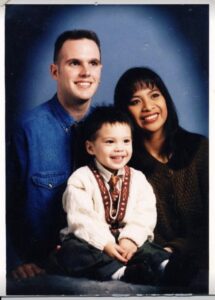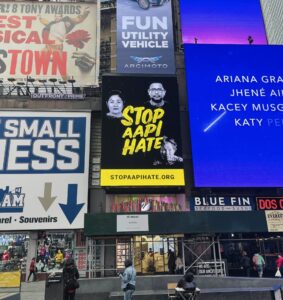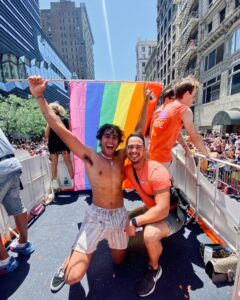
By Nicholas Turton
I didn’t always know where I belonged—or even if I did.
I was born in the early 90s in the small military town of Abilene, Texas. My father, a 22-year-old U.S. Airman of Irish and Polish descent, crossed paths and quickly fell in love with a strikingly beautiful Filipino woman pursuing higher education.
My existence was a testament to two young lovers—and two racial worlds—coming together.
But when I was just three years old, my mother tragically passed away at the age of 25. Losing her left not only the immense void of a mother: it also severed a vital connection to my Filipino heritage. After her passing, my father and I moved to Tonawanda, New York—his small suburban hometown outside of Buffalo where I would spend most of my formative years.
From a very early age, I understood a truth about myself: I was different from those around me. As the only mixed-race person on my father’s side of the family and living in a suburb where over 90% of the population is White, my olive complexion, straight jet-black hair, and more distinct Filipino features weren’t hard to miss. And beyond my physical distinctness, learning how to navigate existing simultaneously between diverse racial and cultural worlds—particularly without my mother—would dictate many experiences in my unique journey of Life.

I didn’t know much at all about what it meant to be half Filipino and half White growing up. But going to school in my small hometown made it quite apparent that it was not something to be proud of. And standing out as different often left me a target of maligned curiosity.
I remember countless encounters in middle school being confronted with “What are you?” or ”No, but where are you really from?” These interrogations treated my multiracial background as an oddity that could not be comprehended—an identity that required substantiating.
High school brought more of the same, but with sharper edges. Stereotypes clung to me like a second skin—illegitimately reinforced whenever I excelled in STEM subjects or when I failed my first driving test. I became a reflection of every misguided cliché my peers held about Asian Americans. Even on the soccer team, where I sought refuge from these labels, my difference was not forgotten. My teammates called me ‘Jackie Chan’ for years—a nickname I initially took as a gesture of acceptance, as I convinced myself it was a sign of belonging. Over time, I came to see it for what it truly was: a casual, insidious form of racism.
Yet it wasn’t just my racial identity that set me apart. From a very young age, I also understood another truth about myself—I was gay. Yet, in the town I grew up in, that truth felt dangerous. The few sermons I heard at church growing up spoke of it as a sin, and at school, those who were out were mocked or ostracized, only confirming what I feared: I didn’t belong.
I vividly remember being questioned directly about my sexuality—sometimes being shouted loudly in front of an entire class full of my peers. The words were sharper in accusation than in curiosity—reminders that it was safer for me to stay hidden.
And so I did. I buried my sexuality, locking it away in the quiet corners of who I was until I left high school. At the same time, I kept my distance from my Filipino identity—unsure of how to embrace a culture I knew very little of, quietly internalizing the message that doing so might only make me stand out more. For several years, I did what I thought I had to: I tried to blend in by shrinking the parts of me that made me different.
Years have passed since those early experiences. But with time, I’ve finally come to arrive at a profound truth: the very aspects of myself that once made me feel like I didn’t belong are, in fact, sources of strength. Through deep reflection and profound moments of vulnerable confrontation, I’ve learned to gather the pieces of myself—the ones that once felt out of place—and build from them a foundation for coming home to who I truly am.
Being a gay, multiracial Filipino man raised in a small-town suburb hasn’t just given me unique perspectives, it’s also given me a profound sense of belonging and a resilience forged in the space between identities.
True belonging, however, is not always something others grant us: it’s something we must claim for ourselves. I’ve come to understand this not only through my personal journey, but through my work as an advocate and communicator with organizations like The Trevor Project, Stop AAPI Hate, and AAPI Data. In each of these spaces, I’ve had the opportunity to uplift stories from communities that mirror my own—to speak out for LGBTQ young people, to shed light on anti-Asian racism, and to help contextualize data that affirms the lived experiences of people too often pushed to the margins.

What I didn’t anticipate was how deeply this work would affirm me. In fighting for belonging for others, I discovered deeper belonging within myself. These opportunities gave me language, community, and purpose—helping me understand not just the power of visibility, but the strength that comes from embracing every part of who I am.
And yet, the historical moment we’re living through is one defined by division—by those who wield power to erase identities and experiences they refuse to understand. States across the U.S. continue to advance record-breaking numbers of bills targeting LGBTQ rights, particularly targeting transgender communities. After Trump’s 2024 election win, anti-Asian hate surged online—Stop AAPI Hate recorded the highest number of anti-Asian slurs since tracking began in January 2023. And my fellow Filipino Americans, in particular, are still reeling from the senseless violence that unfolded in Vancouver last month during the commemoration of Lapu Lapu Day—an attack that claimed the lives of nearly a dozen community members.
It is a profoundly painful moment—one that tells me, once again, that I do not belong. And the stakes are much higher now: beyond whispers in a school hallway or a racist epithet, it is now policies that harm and language that fuels violence and hate.
I know that these attempts to define me and others like me—whether through hateful rhetoric, discriminatory laws, or violent acts—are not a reflection of our worth. They are a reflection of fear: a desperate attempt to cling to a world that cannot accept the beauty of complexity.
Because the truth is, the future belongs to people just like me—it belongs to us. More and more Americans are identifying as LGBTQ than ever before, and people who are multiracial are among the fastest-growing demographics in the U.S. Our stories are not exceptions. We are not footnotes. We are the next chapter of the American story—a mosaic of resilience, complexity, and shared humanity.

As the noise grows louder and the attempts to erase us become more blatant, I stand firmer, more grounded than ever. I return to the memory of my mother—the one I lost before I could fully understand what it meant to be me—and to the connection with her I’ve spent years piecing back together through memory, community, and hope.
I carry her with me in everything I do. In every step toward belonging.
I belong. And so do you.
You have every right to be here.
Nicholas Turton is a Los Angeles-based advocate and strategic communications leader focused on advancing equity and representation across communities. He has led communications, media, and messaging efforts at organizations including AAPI Data, The Trevor Project, and Stop AAPI Hate. Nicholas holds a B.A. in Communication Studies from UC Santa Barbara and an M.A. in Nonprofit Management from Antioch University Los Angeles.












